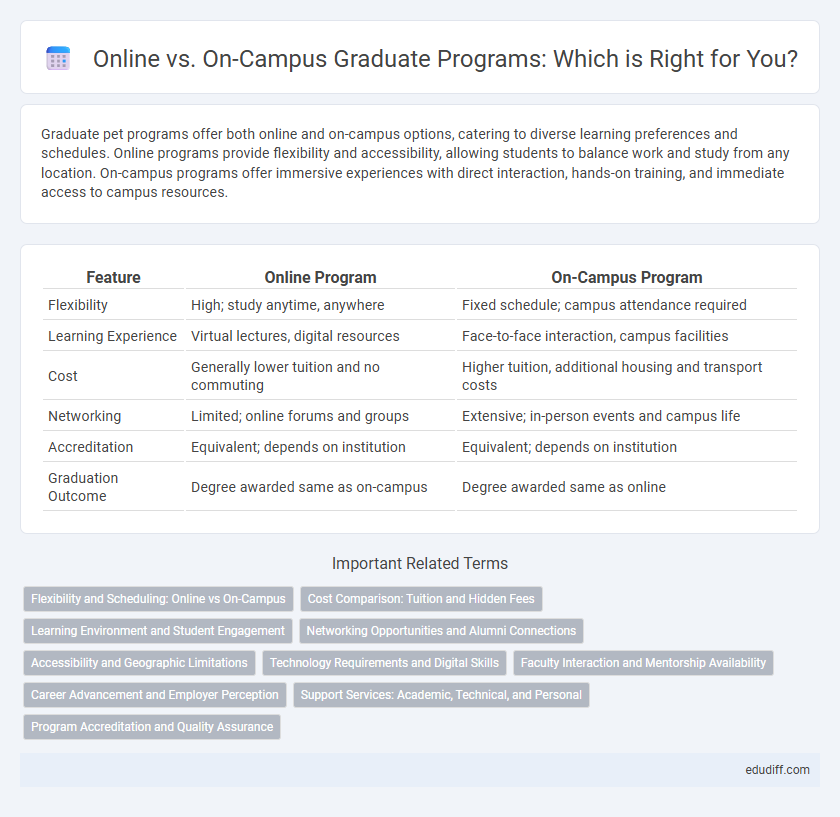Graduate pet programs offer both online and on-campus options, catering to diverse learning preferences and schedules. Online programs provide flexibility and accessibility, allowing students to balance work and study from any location. On-campus programs offer immersive experiences with direct interaction, hands-on training, and immediate access to campus resources.
Table of Comparison
| Feature | Online Program | On-Campus Program |
|---|---|---|
| Flexibility | High; study anytime, anywhere | Fixed schedule; campus attendance required |
| Learning Experience | Virtual lectures, digital resources | Face-to-face interaction, campus facilities |
| Cost | Generally lower tuition and no commuting | Higher tuition, additional housing and transport costs |
| Networking | Limited; online forums and groups | Extensive; in-person events and campus life |
| Accreditation | Equivalent; depends on institution | Equivalent; depends on institution |
| Graduation Outcome | Degree awarded same as on-campus | Degree awarded same as online |
Flexibility and Scheduling: Online vs On-Campus
Online graduate programs offer unparalleled flexibility by allowing students to access course materials and complete assignments on their own schedule, accommodating working professionals and those with family responsibilities. On-campus programs often require fixed class times and physical attendance, which can limit scheduling options but provide structured learning environments and real-time interaction. The choice between online and on-campus formats depends on individual preferences for flexibility versus face-to-face engagement.
Cost Comparison: Tuition and Hidden Fees
Online programs typically offer lower tuition rates than on-campus programs, making them a cost-effective option for many graduate students. Hidden fees such as commuting expenses, housing, and campus service fees often increase the overall cost of on-campus education. Evaluating total expenses including technology fees for online access and materials can help students make informed decisions regarding financial investment in their graduate education.
Learning Environment and Student Engagement
Online graduate programs offer flexible learning environments that enable students to access course materials anytime, fostering self-paced study and accommodating diverse schedules. On-campus programs provide immersive experiences with face-to-face interactions, promoting spontaneous discussions and stronger peer connections crucial for collaborative projects. Student engagement in online settings relies heavily on interactive platforms and virtual collaboration tools, while on-campus engagement benefits from immediate feedback and campus resources such as libraries and study groups.
Networking Opportunities and Alumni Connections
Online programs offer flexible access to a global network of professionals, enabling graduates to connect with diverse alumni across industries and geographies. On-campus programs facilitate face-to-face interactions through events, club activities, and career fairs, fostering deeper local networking and immediate collaboration. Both online and on-campus formats provide unique platforms for building robust professional relationships vital for career advancement.
Accessibility and Geographic Limitations
Online graduate programs offer unparalleled accessibility by removing geographic limitations, enabling students to enroll from anywhere in the world without relocating. On-campus programs require physical presence, which can restrict access for students living far from the institution or with mobility constraints. The flexibility of online formats supports continuous learning for working professionals, while on-campus programs provide face-to-face interaction and networking opportunities limited by location.
Technology Requirements and Digital Skills
Online graduate programs require advanced technology such as a reliable high-speed internet connection, a modern computer with updated software, and familiarity with learning management systems like Blackboard or Canvas. On-campus programs emphasize basic digital skills for accessing campus resources but rely more on face-to-face interaction and physical attendance. Mastery of virtual collaboration tools and digital communication is critical for success in online programs, while on-campus students benefit from in-person technological support and hands-on technology use.
Faculty Interaction and Mentorship Availability
Graduate students in online programs often experience limited real-time faculty interaction and mentorship opportunities compared to on-campus programs, where face-to-face engagement fosters deeper academic support. On-campus graduate programs provide immediate access to professors and research mentors, enhancing personalized guidance and collaborative learning. Faculty availability in physical settings significantly contributes to networking, professional development, and tailored academic advising, which can be less accessible in virtual environments.
Career Advancement and Employer Perception
Online graduate programs offer flexible scheduling and accessibility, attracting working professionals aiming for career advancement without disrupting their employment. Employers increasingly recognize accredited online degrees as equivalent in rigor and quality to traditional on-campus programs, enhancing graduates' credibility in the job market. Career advancement opportunities often align with individual performance and skill application, making the modality of education less impactful than the degree's reputation and relevance to industry standards.
Support Services: Academic, Technical, and Personal
Online graduate programs offer 24/7 academic support through virtual tutoring, digital libraries, and interactive platforms, ensuring continuous learning assistance. Technical support is streamlined with dedicated help desks and real-time chat services tailored for remote access, minimizing disruptions during coursework. Personal support includes virtual counseling and online peer networks, fostering a sense of community despite physical distance.
Program Accreditation and Quality Assurance
Accreditation plays a crucial role in both online and on-campus graduate programs, ensuring they meet established academic standards and quality benchmarks set by recognized accrediting bodies. Quality assurance processes for accredited programs include regular curriculum reviews, faculty qualifications assessment, and student outcome evaluations, which maintain the integrity and value of the degree. Prospective students should verify that the graduate program, whether online or on-campus, holds accreditation from reputable agencies such as the Higher Learning Commission or AACSB to guarantee a credible and respected education.
Online Program vs On-Campus Program Infographic

 edudiff.com
edudiff.com